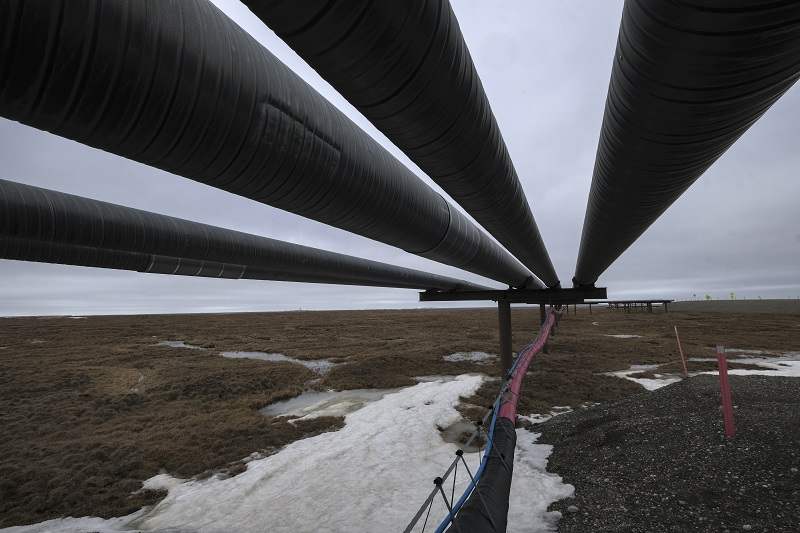
Oil pipelines stretch across the landscape outside Nuiqsut, AK where ConocoPhillips operates the Alpine Field on May 29, 2019
15:12 JST, July 9, 2022
The Joe Biden administration on Friday released a new environmental assessment of a controversial oil project on Alaska’s North Slope but declined to reveal whether it was leaning toward approving a project that has faced stiff opposition from environmentalists and some Native Alaskans worried it will disrupt their subsistence lifestyle.
Climate activists had hoped that the administration would either sharply curtail or end a multibillion-dollar effort by the energy giant ConocoPhillips to expand oil infrastructure in the Alaskan Arctic, a project known as Willow. Environmentalists argue that burning all that new fossil fuel would undercut much of President Biden’s climate agenda, which proposes cutting emissions by more than 50 percent by 2030 compared to 2005 levels.
But the draft environmental impact statement, from the Bureau of Land Management, evaluated different alternatives, and did not express a preference. The alternatives included reducing the number of drilling sites — and building nothing at all — but environmentalists greeted the new assessment as another worrying step on the road to approval. A public comment period now ensues, followed by a final decision.
“We are disappointed to see BLM moving forward with considering the Willow plan when it is so clearly inconsistent with the goals this administration has set to transition away from fossil fuels and avert the worst consequences of the climate crisis,” said Jeremy Lieb, an attorney with Earthjustice, in a statement. “This single project, which will release a staggering amount of climate pollution, threatens to send us dangerously off track by undercutting urgently needed measures to reduce greenhouse-gas emissions.
Willow, which was approved in the final year of the Trump administration, would bring hundreds of miles of roads and pipelines, and between three to five drilling sites, airstrips, a gravel mine, and a large new processing facility, to the pristine tundra and wetlands of the National Petroleum Reserve — Alaska, the largest block of public land in the country. There are currently only two drilling sites producing oil in the 23 million acre reserve, both run by ConocoPhillips.
A ConocoPhillips spokesperson on Friday said it was committed to Willow because “it will supply much needed energy for the United States, while serving as a strong example of environmentally and socially responsible development that offers extensive public benefits.”
Alaska’s political leaders have long supported the Willow project as a way to bolster oil production on the North Slope that has been declining since the 1980s. With soaring gas prices, and supply disruptions due to Russia’s invasion of Ukraine, the Biden administration has also faced growing political pressure to boost production.
Sen. Lisa Murkowski, R-Ak, described the project as her “top priority” for the administration and said she wants to see construction begin this winter.
“Responsibly-developed Alaskan energy benefits both our national security and American families who are facing near-record energy prices,” Murkowski said in a statement.
Following its approval at the end of 2020, the project was quickly challenged in court. Last year, a federal judge found that the government failed to fully consider different project alternatives or assess how burning the oil pulled from the ground would warm the planet. As part of that litigation, the judge required the Interior Department to conduct an updated environmental review.
Over the three decade life of the project, Willow is estimated to generate 629 million barrels of oil — up from 586 million barrels in an earlier estimate.
The new review added more discussion on why climate change is a problem and its costs to society. It mentioned that interior and northern areas of Alaska are projected to warm by 10 to 16 degrees Fahrenheit by the late 21st century, under a high emissions scenario.
The review estimated the project would generate between 278 and 284 million metric tons of carbon dioxide, depending on which alternative is chosen. Environmental groups equated the earlier project estimate, of 260 million metric tons, to the emissions produced by 66 coal plants.
“This is an enormous project that they’re now disclosing is even bigger,” Lieb, of Earthjustice, said in an interview. “Approving it is incompatible with what science says needs to happen and what this administration has committed to doing to respond to climate change.”
ConocoPhillips officials have also told investors that the infrastructure built for Willow could ultimately unlock up to 3 billion barrels of oil. Fossil fuel drilling and mining on public lands already account for nearly a quarter of the country’s greenhouse gas emissions.
The Biden administration has sought a balancing act with its Alaska oil policy.
Willow would extend ConocoPhillips’s footprint further to the west across the North Slope, towards Teshekpuk Lake, the largest lake in the Alaskan Arctic.
In the nearest town of Nuiqsut, the oil industry is already a divisive topic. Some residents believe the economic rewards have lifted the standard of living far above other Native Alaskan villages, while others consider the industry a source of health problems and poor air quality. Many residents still depend on hunting and whaling for subsistence and fear that more drilling pads and pipelines will push migrating caribou further from the village.
In March, natural gas began leaking from the ground at Alpine, a neighboring ConocoPhillips facility. The leak caused ConocoPhillips to evacuate some 300 of its employees from the site and sparked panic in Nuiqsut, prompting several families to flee the area. It has also caused some residents to feel increasingly concerned about a major expansion of the oil industry.
Top Articles in News Services
-

Survey Shows False Election Info Perceived as True
-

Prudential Life Expected to Face Inspection over Fraud
-

Hong Kong Ex-Publisher Jimmy Lai’s Sentence Raises International Outcry as China Defends It
-

Japan’s Nikkei Stock Average Touches 58,000 as Yen, Jgbs Rally on Election Fallout (UPDATE 1)
-

Trump Names Former Federal Reserve Governor Warsh as the Next Fed Chair, Replacing Powell
JN ACCESS RANKING
-

Japan PM Takaichi’s Cabinet Resigns en Masse
-

Japan Institute to Use Domestic Commercial Optical Lattice Clock to Set Japan Standard Time
-

Israeli Ambassador to Japan Speaks about Japan’s Role in the Reconstruction of Gaza
-

Man Infected with Measles May Have Come in Contact with Many People in Tokyo, Went to Store, Restaurant Around When Symptoms Emerged
-

Man Infected with Measles Reportedly Dined at Restaurant in Tokyo Station




















